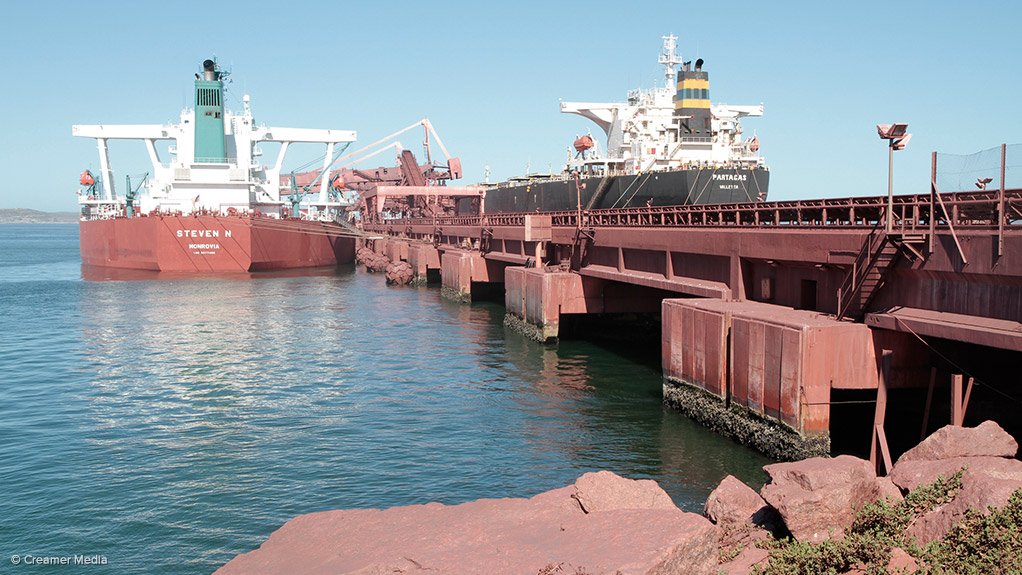South African iron-ore miner Kumba Iron Ore recorded a 3% year-on-year decrease in output to 9.4-million tonnes for the third quarter ended September 30, as derailments, rail breakages and speed restrictions on State-owned Transnet's rail line resulted in an 8% year-on-year decrease in ore railed to port, at 9.1-million tonnes.
Compared with the second quarter of this year, which was impacted by a five-day mini-shut in April, ore railed to port increased by 5%.
Despite logistics constraints, sales improved by 2% year-on-year to nine-million tonnes for the third quarter.
"This follows consistent efforts by the Ore User's Forum (OUF) to work closely with Transnet to reduce the impact of equipment breakdown at the Saldanha Bay port terminal," Kumba notes.
However, sales decreased by 6% quarter-on-quarter owing to 11 days of adverse weather conditions in July having impacted on ship loading.
"Given this, sales volumes are expected to end the year closer to the lower end of the full-year 2024 sales guidance of 36-million to 38-million tonnes, subject to logistics performance and further potential downside risk following the reopening of Saldanha Bay port.
"Kumba and its OUF peers continued to collaborate with Transnet, including by providing support in the planning and implementation of the ten-day annual logistics maintenance shutdown which commenced on October 8. Following successful completion of the annual maintenance, the Sishen-Saldanha Bay port line reopened as scheduled on October 18, with a significant number of speed restrictions lifted. On October 23, Saldanha Bay port also reopened as planned and the ramp-up in port activities is being closely monitored," Kumba points out.
Kumba CEO Mpumi Zikalala comments that the company's focus on operational excellence continued to deliver a safe and solid operational performance.
"Our year-to-date 2024 total recordable injury frequency rate improved to 0.86 from 1.10 in the comparative 2023 period. This demonstrates our relentless focus and commitment to eliminating fatalities and achieving zero harm for all our people.
"Production increased by 3% compared with the second quarter of this year and we are on track to deliver our full-year 2024 guidance of 35-million to 37-million tonnes. Our cost optimisation programme is progressing well, and we continue to target a C1 unit cost of $38/t for the full year," she adds.
Kumba notes that the savings from the right-sizing of its mining fleet, improved operational efficiencies and supply chain management, as well as the optimised use of consumables and a more streamlined organisational structure, mean the company is on track to achieve the unit cost guidance of between R520/t and R550/t for Sishen and between R410/t and R440/t for Kolomela.
Turning to market demand, the miner says the economic recovery in China has been uneven, with growth in manufacturing and export-focused industries partly offset by a shrinking construction sector.
The implementation of stimulus measures announced by China in recent weeks, coupled with seasonal factors, are expected to be constructive for the iron-ore market in the months ahead.
"In the longer term, as steel production shifts to direct reduced iron steelmaking, which has significantly lower emissions compared to the traditional blast furnace route, demand for direct charge materials such as Kumba's high-quality iron-ore lump, will grow rapidly.
"The resumption of our ultrahigh-dense-medium-separation (UHDMS) technology project recently announced on August 29, should treble the proportion of premium iron-ore produced at our world-class Sishen mine, ensuring that Kumba continues to play a key role in the green steel value chain," says Zikalala.
Kumba's board in August approved a further R7.6-billion investment in UHDMS processing technology at the Sishen mine, following the completion of a full technical review of the miner’s UHDMS project. The investment is in addition to the R3.6-billion approved for the project in February 2021, taking the total capital investment in the project to R11.2-billion.
At the time of announcing the approval, Zikalala said the “compelling” investment would be a key differentiator for the company, enabling it to increase the volume of premium iron-ore produced at Sishen to about 55%, up from the current 18%.
Edited by: Creamer Media Reporter
EMAIL THIS ARTICLE SAVE THIS ARTICLE
ARTICLE ENQUIRY
To subscribe email subscriptions@creamermedia.co.za or click here
To advertise email advertising@creamermedia.co.za or click here













